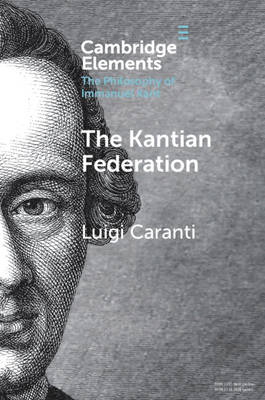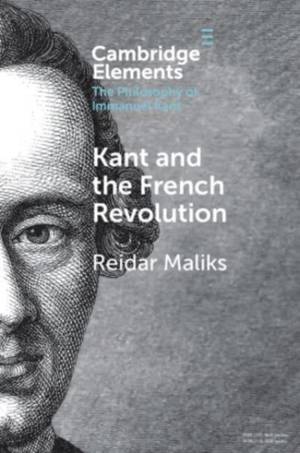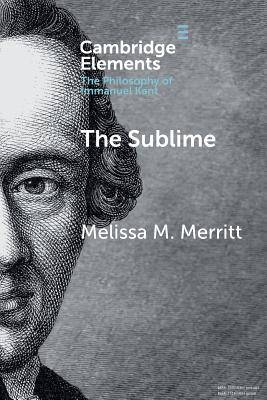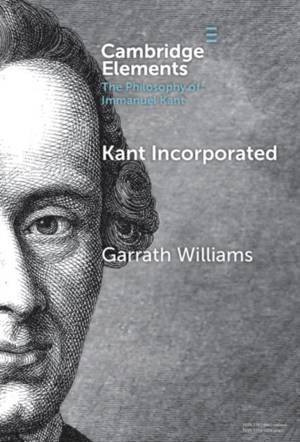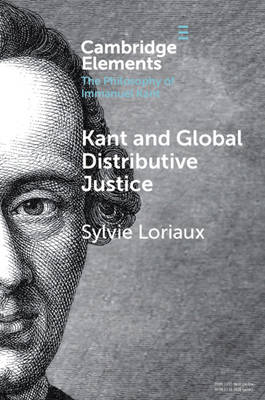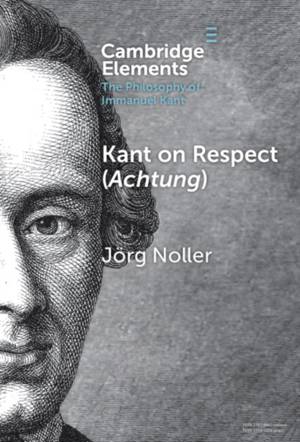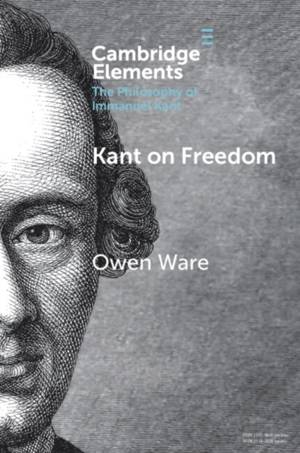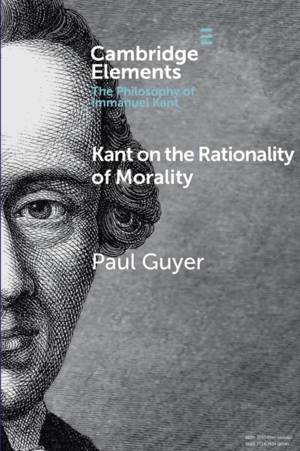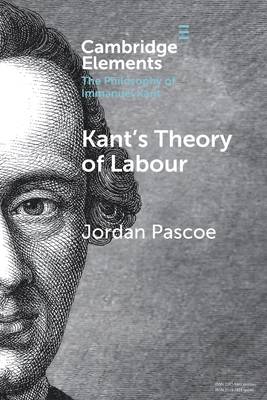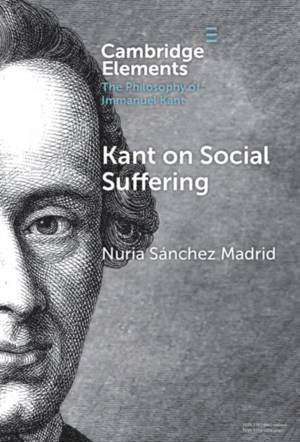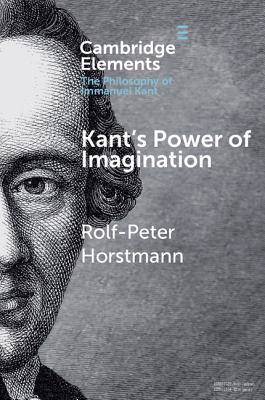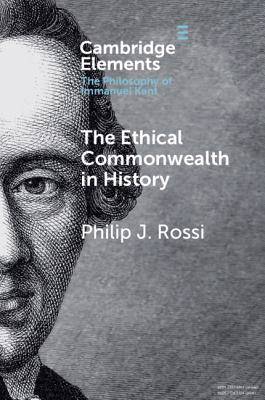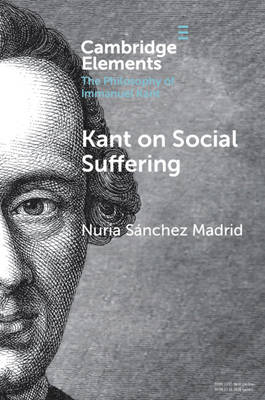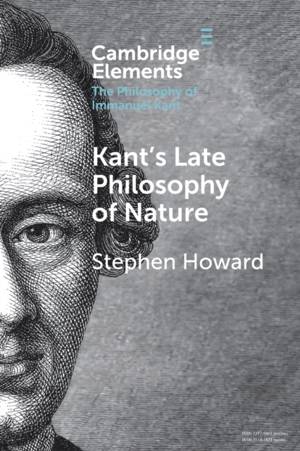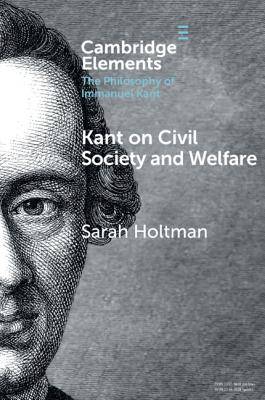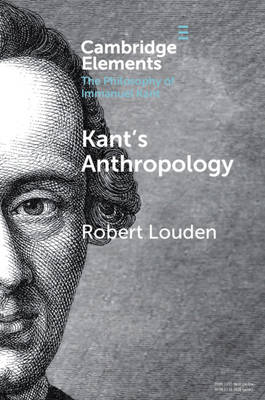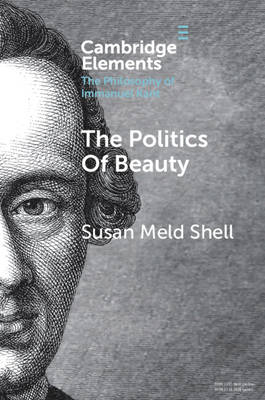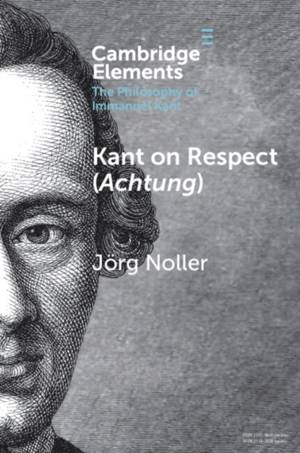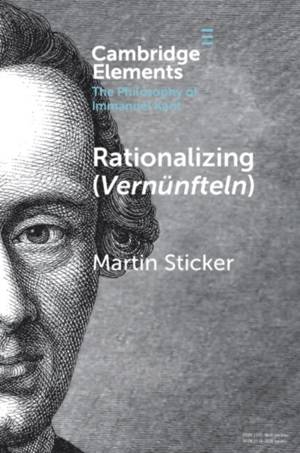
Je cadeautjes zeker op tijd in huis hebben voor de feestdagen? Kom langs in onze winkels en vind het perfecte geschenk!
- Afhalen na 1 uur in een winkel met voorraad
- Gratis thuislevering in België vanaf € 30
- Ruim aanbod met 7 miljoen producten
Je cadeautjes zeker op tijd in huis hebben voor de feestdagen? Kom langs in onze winkels en vind het perfecte geschenk!
- Afhalen na 1 uur in een winkel met voorraad
- Gratis thuislevering in België vanaf € 30
- Ruim aanbod met 7 miljoen producten
Zoeken
Reeksen: boeken uit de reeks Elements in the Philosophy of Immanuel Kant
-
The Kantian Federation
Luigi Caranti
- Paperback | Engels | Elements in the Philosophy of Immanuel Kant
- This Element introduces the reader to Kant's theory of peace and to its place in the broader context of the critical philosophy. It also delves into o... Lees meer
€ 33,45Levering 2 à 3 weken€ 33,45Levering 2 à 3 weken -
Kant's Natural Philosophy
Marius Stan
- Paperback | Engels | Elements in the Philosophy of Immanuel Kant
- This Element analyzes Kant's metaphysics and epistemology of the exact science of nature. It explains his theory of true motion and ontology of matter... Lees meer
€ 22,95Levering 1 à 2 weken Afhalen in de winkel na 1 u.€ 22,95Levering 1 à 2 weken Afhalen in de winkel na 1 u. -
Kant and the French Revolution
Reidar Maliks
- Paperback | Engels | Elements in the Philosophy of Immanuel Kant
- To Kant, the French revolution's central events were the transfer of sovereignty to the people in 1789 and the trial and execution of the monarch in 1... Lees meer
€ 33,45Levering 2 à 3 weken€ 33,45Levering 2 à 3 weken -
The Sublime
Melissa McBay Merritt
- Paperback | Engels | Elements in the Philosophy of Immanuel Kant
- This Element considers Kant's account of the sublime in the context of his predecessors both in the Anglophone and German rationalist traditions. Sinc... Lees meer
€ 37,45Levering 2 à 3 weken€ 37,45Levering 2 à 3 weken -
Kant Incorporated
Garrath Williams
- Hardcover | Engels | Elements in the Philosophy of Immanuel Kant
- Corporations are legal bodies with duties and powers distinct from those of individual people. Kant discusses them in many places. He endorses univers... Lees meer
€ 112,95Levering 2 à 3 weken€ 112,95Levering 2 à 3 weken -
Kant and Global Distributive Justice
Sylvie Loriaux
- Paperback | Engels | Elements in the Philosophy of Immanuel Kant
- This Element argues that although Kant's political thought does not tackle issues of global poverty and inequality head on, it nonetheless offers impo... Lees meer
€ 33,45Levering 2 à 3 weken€ 33,45Levering 2 à 3 weken -
Formulas of the Moral Law
Allen Wood
- Paperback | Engels | Elements in the Philosophy of Immanuel Kant
- This Element defends a reading of Kant's formulas of the moral law in Groundwork of the Metaphysics of Morals. It disputes a long tradition concerning... Lees meer
€ 33,45Levering 2 à 3 weken€ 33,45Levering 2 à 3 weken -
Kant on Respect (Achtung)
Jorg (LMU Munich) Noller
- Hardcover | Elements in the Philosophy of Immanuel Kant
- This Element reconstructs Kant's puzzling statements about the moral feeling of respect (Achtung), which is 'a feeling self-wrought by means of a rati... Lees meer
€ 79,45Pre-order nu, verschijnt op 31/01/2026€ 79,45Pre-order nu, verschijnt op 31/01/2026 -
Kant on Freedom
Owen Ware
- Paperback | Engels | Elements in the Philosophy of Immanuel Kant
- Kant's early critics maintained that his theory of freedom faces a dilemma: either it reduces the will's activity to strict necessity by making it sub... Lees meer
€ 33,45Levering 2 à 3 weken€ 33,45Levering 2 à 3 weken -
Kant on the Rationality of Morality
Paul Guyer
- Paperback | Engels | Elements in the Philosophy of Immanuel Kant
- Kant claims that the fundamental principle of morality is given by pure reason itself. Many have interpreted Kant to derive this principle from a conc... Lees meer
€ 33,45Levering 2 à 3 weken€ 33,45Levering 2 à 3 weken -
Kant's Theory of Labour
Jordan Pascoe
- Paperback | Engels | Elements in the Philosophy of Immanuel Kant
- This Element examines Kant's innovative account of labour in his political philosophy and develops an intersectional analysis of Kant. By demonstratin... Lees meer
€ 33,45Levering 2 à 3 weken€ 33,45Levering 2 à 3 weken -
Kant on Social Suffering
Nuria Sánchez Madrid
- Hardcover | Engels | Elements in the Philosophy of Immanuel Kant
- This Element analyses how Kant's practical philosophy approaches social suffering, while also taking into account the elusiveness of this concept in h... Lees meer
€ 112,95Levering 2 à 3 weken€ 112,95Levering 2 à 3 weken -
Kant Incorporated
Garrath Williams
- Paperback | Engels | Elements in the Philosophy of Immanuel Kant
- Corporations are legal bodies with duties and powers distinct from those of individual people. Kant discusses them in many places. He endorses univers... Lees meer
€ 24,45Levering 1 à 2 weken€ 24,45Levering 1 à 2 weken -
Kant's Power of Imagination
Rolf-Peter Horstmann
- Paperback | Engels | Elements in the Philosophy of Immanuel Kant
- This Element is a study of how the power of imagination is, according to Kant, supposed to contribute to cognition. It is meant to be an immanent and ... Lees meer
€ 33,45Levering 2 à 3 weken€ 33,45Levering 2 à 3 weken -
The Ethical Commonwealth in History
Philip J Rossi
- Paperback | Engels | Elements in the Philosophy of Immanuel Kant
- The 'ethical commonwealth', the central social element in Kant's account of religion, provides the church, as 'the moral people of God', with a role i... Lees meer
€ 33,45Levering 2 à 3 weken€ 33,45Levering 2 à 3 weken -
Kant on Social Suffering
Nuria Sánchez Madrid
- Paperback | Engels | Elements in the Philosophy of Immanuel Kant
- This Element analyses how Kant's practical philosophy approaches social suffering, while also taking into account the elusiveness of this concept in h... Lees meer
€ 33,45Levering 2 à 3 weken€ 33,45Levering 2 à 3 weken -
Kant's Late Philosophy of Nature
Stephen Howard
- Paperback | Engels | Elements in the Philosophy of Immanuel Kant
- Kant's final drafts, known as his Opus postumum, attempt to make what he calls a 'transition from the metaphysical foundations of natural science to p... Lees meer
€ 33,45Levering 2 à 3 weken€ 33,45Levering 2 à 3 weken -
Kant on Civil Society and Welfare
Sarah Holtman
- Paperback | Engels | Elements in the Philosophy of Immanuel Kant
- What justifies state-sponsored supports for individual welfare within a Kantian political system, as well as the purpose and extent of such supports a... Lees meer
€ 37,45Levering 2 à 3 weken€ 37,45Levering 2 à 3 weken -
Anthropology from a Kantian Point of View
Robert B Louden
- Paperback | Engels | Elements in the Philosophy of Immanuel Kant
- Kant's anthropological works represent a very different side of his philosophy, one that stands in sharp contrast to the critical philosophy of the th... Lees meer
€ 33,45Levering 2 à 3 weken€ 33,45Levering 2 à 3 weken -
The Politics of Beauty
Susan Meld Shell
- Paperback | Engels | Elements in the Philosophy of Immanuel Kant
- This Element examines the entirety of Kant's Critique of Taste (in Part One of the Critique of Judgment) with particular emphasis on its political and... Lees meer
€ 33,45Levering 2 à 3 weken€ 33,45Levering 2 à 3 weken -
Kant on Respect (Achtung)
Jorg (LMU Munich) Noller
- Paperback | Elements in the Philosophy of Immanuel Kant
- This Element reconstructs Kant's puzzling statements about the moral feeling of respect (Achtung), which is 'a feeling self-wrought by means of a rati... Lees meer
€ 24,45Pre-order nu, verschijnt op 31/01/2026€ 24,45Pre-order nu, verschijnt op 31/01/2026 -
Rationalizing (Vernünfteln)
Martin Sticker
- Paperback | Engels | Elements in the Philosophy of Immanuel Kant
- Kant was a keen psychological observer and theorist of the forms, mechanisms and sources of self-deception. In this Element, the author discusses the ... Lees meer
€ 26,95Levering 1 à 2 weken€ 26,95Levering 1 à 2 weken
22 van 22 resultaten getoond







